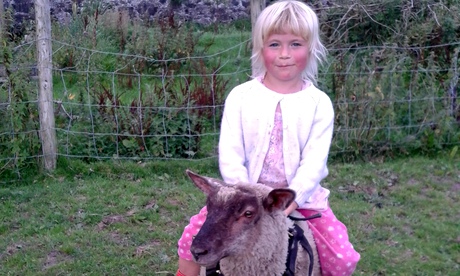
Snapshot: Hazel on Longback, our placid sheep
This is a picture of my daughter Hazel with her favourite sheep, Longback.
She bottle-fed her as an orphan lamb along with four others. Hazel names lambs in the native American, descriptive manner such as Weak Weak, Blackhead and Ratail.
One day, left to her own devices, she shouted, “Look, Mummy, I’m riding her,” and when I looked she was sitting astride, looking totally relaxed.

She has no interest in ponies but would often ride the obliging Longback round the field. We have a very small flock and she has names and characters for them all. She is an only child so she sees them as part of our extended family. Longback is a very placid sheep, who likes a head massage and slices of apple.
I think Hazel has the childhood I would have loved, living in the countryside with lots of animals – I grew up in the Worthing suburbs and lived in London when I was at college.
We used to live in Sussex, renting a smallholding but could never afford to buy a few acres, so we moved to Ireland, and for the price of a flat in Sussex bought a house with 12 acres in the beautiful Comeragh mountains.
I think this picture will bring back happy memories of simple pleasures when Hazel is grown-up.
Simone McGoldrick
Playlist: Only love can make me listen to …
Only Love by Nana Mouskouri
“Only love can make a memory / Only love can make a moment last / You were there / And all the world was young / And all its songs unsung”
Of the 350m albums sold by Nana Mouskouri, we had just the one. It made up a quarter of my parents’ record collection (the others being the soundtracks of The Sound of Music and The King and I, Perry Como’s greatest hits and The Clancy Brothers and Tommy Makem).
We watched her 70s TV show every week with its – to my young, dismissive ears – strange collection of MOR and world music. Maybe it was her internationalism that interested my dad (who was the fan) or maybe just her Greek allure.
As a teenager then, my taste revolved around David Bowie, Lou Reed and Iggy Pop. I sneered at Nana Mouskouri. Her album – a collection of greatest hits – disappeared a long time ago and was certainly never missed by me. Dad died 15 years ago but it’s funny how things turn out.
Now half my CD collection consists of just the sort of world musicians who might typically have had a guest spot on Nana’s TV show. Maybe that’s where it all started. Stranger still, when I saw she was coming to Glasgow as part of a tour to celebrate her 80th birthday I felt drawn to attend. I think I did it for my dad.
I managed to persuade my wife and a couple of friends to come along and Nana enchanted and delighted each one of us for two hours with her timeless voice and ageless charm. Sitting there, four rows from the front and 40 years back in time, I felt Dad beside me. I wasn’t sneering any more. He was there when all my world was young and he was there that night.
Looking around, I wondered how many others were feeling the same. The hall could never have been so full – an audience and all its memories. What is it that can make a moment last? Only love.
Michael Chromy
We love to eat: Dad’s sketty modge, far ahead of its time
Ingredients
1 can of plum tomatoes
I large onion
300g of smoked streaky bacon
150g of cheddar cheese
250g dried spaghetti
1 tsp of madras curry powder
1 tsp of chapped mint
1 clove of garlic
While the spaghetti is cooking, dice the onion and fry in oil and the curry powder until it is translucent. Finely chop the bacon and add to the mixture, and fry until the bacon is cooked. Add the entire contents of the can of tomatoes and reduce the mixture to a paste. Add the mint and crushed garlic. Place the mixture on a bed of cooked spaghetti in an oven-proof dish, and cover the mixture with grated cheeses. Finally, grill until the cheese is bubbling.
The modge should now be reasonably firm and can be served in individual portions – this recipe serves four.
Our family dish was invented in the early 1960s by my father and, bizarrely, started life as a breakfast dish. The routine on a Sunday morning was we all went off to the swimming baths and returned refreshed but exhausted for the Sunday morning treat, sketty modge. The name comes from the word modge, to do shoddily; make a mess of, and sketty, which was what the youngest in the family called spaghetti.
The spec for Sunday breakfast was simple. It had to stick to the ribs of two adults and seven children, it had to be ready in 30 minutes, and had to appeal to the diverse tastes of teenagers at one end of the age spectrum and babes in arms at the other.
Sketty modge was completely successful at this task. Ahead of its time in many ways, it incorporated pasta at a time when the only spaghetti you could get in the shops came in cans, and madras curry powder, which you could only get on the black market.
It became a favourite of everybody in the family, and moved from breakfast to an evening meal. As the kids grew up and left home so did sketty modge. Young students, keen to impress friends, would phone home for the recipe. To our certain knowledge it has emigrated to Australia, New Zealand, USA, Bahrain and Newcastle. It has been passed on to two more generations, and so it goes on in its own modest way, a legend.
Over the past 50 years, sketty modge has had various improvements, embellishments or ornamentations depending on the tastes or prejudices of whoever happens to be cooking it. These included the addition of one or more of the following: pimentos, chopped courgettes, chopped celery, leaks, and/or additional curry powder. There is also scope for splashing a drop or two of wine into it. However, we all understand that if the basic core of the dish is sketty modge then the dish is sketty modge, and there’s an end to it.
Finally, in a concession to healthy eating, most of us now use back bacon with the fat trimmed off it. There is a heresy in the family where plain bacon is used instead of smoked bacon, but the less said about that the better.
Andy Stanton
We’d love to hear your stories
We will pay £25 for every Letter to, Playlist, Snapshot or We love to eat we publish. Write to Family Life, The Guardian, Kings Place, 90 York Way, London N1 9GU or email family@theguardian.com. Please include your address and phone number

